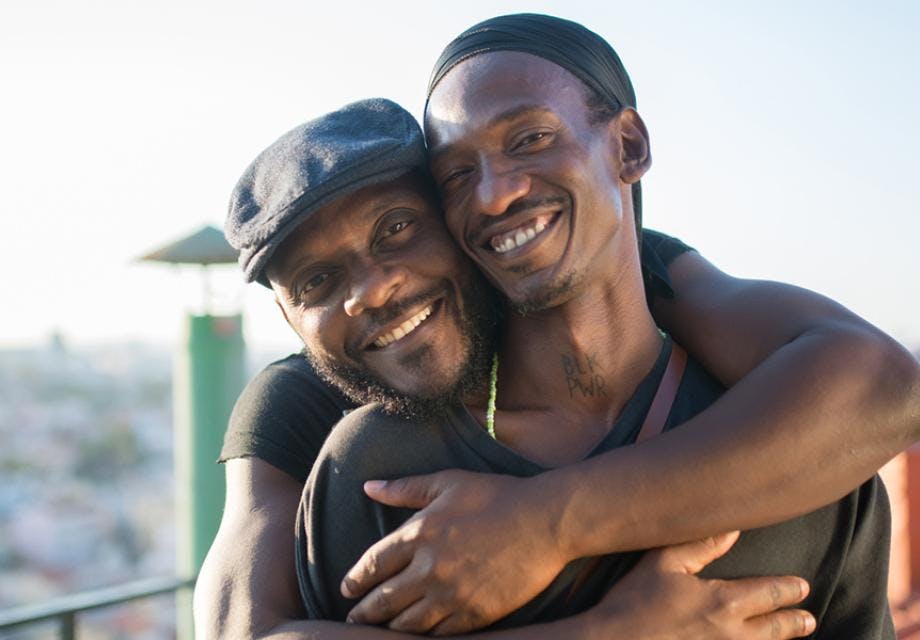As a gay man how do I talk to my partner about HIV prevention?
Hester Phillips
01 November 2023
Talking to your partner about HIV might feel like the biggest passion killer. But it’s important to do. Here’s how to raise the issue without dampening the mood
We get it – talking to your partner about HIV prevention can feel difficult. But if you are gay or bisexual, or a man who has sex with men, your risk of getting HIV is high IF you don’t take action to protect your health. So whether you have been in a relationship for days, months or years, here’s what you need to know to get the conversation going.
How do I talk to my partner about HIV prevention?
Talking about HIV prevention is not only the right thing to do, it’s also totally normal. Lots of couples have these sorts of conversations, it’s part of being in a healthy relationship.
If you haven’t spoken about anything to do with sex before, why not start by discussing what turns you both on? Not only can these conversations lead to amazing sex, it will make it easier to talk about the less steamy side of things, like HIV prevention.
Some people worry that mentioning HIV will make it look like they don’t trust their partner or they are being unfaithful. But the truth is that talking about HIV prevention shows you care about your partner’s health and your own. Let your partner know this is why you want to discuss HIV prevention – so you can both relax and enjoy sex together.
What HIV prevention options can I use in a relationship?
You can use as many of these methods as you like. What you use will depend on the type of relationship you are in, and it might change over time.
Condoms and lube
Condoms are the best way to prevent HIV and other sexually transmitted infections (STIs). You can use external ones for the penis or internal ones for the anus. We know condoms have an unsexy reputation. But our tips on how to have great sex using condoms will make you see things differently.
Using a water-based lube makes condoms less likely to break. It also reduces the risk of anal tears, which gives HIV less chance to enter the body. Lube makes sex feel fantastic too.
PrEP
Taking PrEP will stop you from getting HIV. But it doesn’t protect against other STIs. PrEP normally comes in daily pills. But in some places you can get PrEP injections which last longer.
Sexual health checks
Taking regular STI and HIV tests and sharing the results means you will both know about each other’s health. It’s a great way to build trust too. Having an STI makes it easier for HIV to enter the body. So if either of you have one, get treatment quickly. And if one of you gets diagnosed with HIV don’t panic, just start HIV treatment straight away.
What HIV prevention options are there if one of us has HIV?
Taking antiretroviral treatment can reduce HIV to such low levels that it cannot be passed on through sex. For this to happen, the partner with HIV has to take their treatment properly and go for regular monitoring. If this monitoring shows that HIV is no longer detectable, it will be untransmittable through sex. That’s why people call this U=U (undectable equals untransmittable).
PrEP and condoms are also safe and effective options if one of you has HIV but does not know if the virus is detectable or not. Here’s what to do if your partner has HIV but doesn’t want to use a condom, and how to get the HIV prevention conversation going in the first place.
If you have had unprotected sex in the last three days, it might be effective for the HIV-negative partner to take PEP. But this only prevents infection if it is taken within 72 hours. PEP isn’t designed be taken regularly – PrEP is a much better option.
What is a sexual agreement?
Different people want different things from relationships. Some people want to be in a completely faithful relationship. Others want to be in a relationship and still have sex with other people. The most important thing is to be honest about what you both want. And that what you both want matches up, whatever it is.
Some couples like to have a ‘sexual agreement’. This is when you agree how you will both behave. If you both agree to be faithful, and can trust each other to do so, your HIV risk will be lower than if you have agreed to an open relationship. If you are in an open relationship, agreeing to take HIV prevention measures is really important. What HIV prevention measures you use with other people and each other can be part of your sexual agreement.
Get our news and blogs by email
Keep up-to-date with all our latest news stories and blogs by signing up to the Be in the KNOW news digest.
